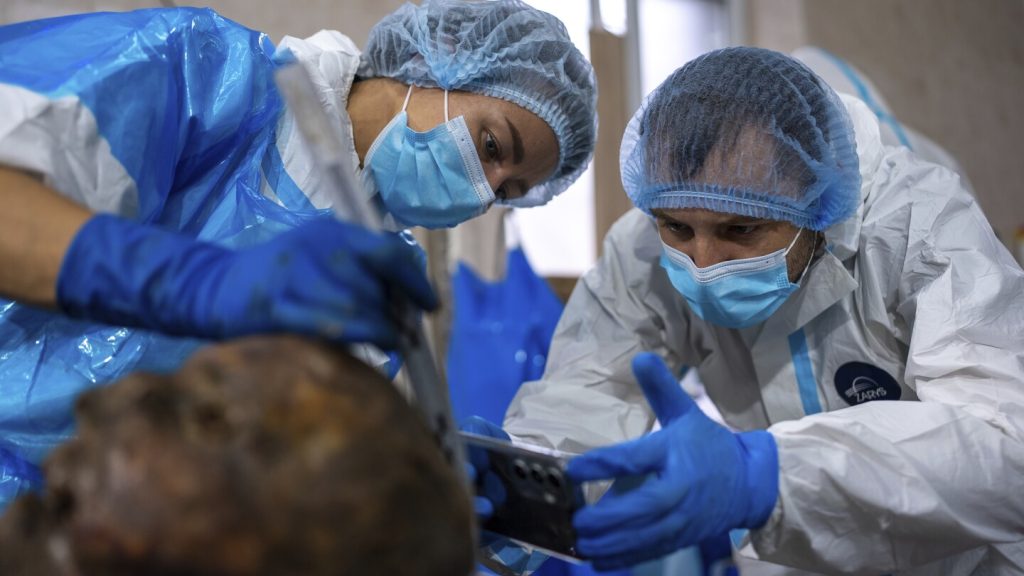KYIV, Ukraine (AP) — Over 200 Ukrainian prisoners of war (POWs) have died while incarcerated since Russia launched its full-scale invasion three years ago.
Human rights organizations, the U.N., and Ukrainian officials indicate that maltreatment within Russian prisons likely factors into many of these fatalities, reinforcing claims that Russia is systematically abusing captured soldiers, as noted by a Ukrainian medical examiner who has conducted numerous POW autopsies.
Ukrainian authorities assert that the recurring return of disfigured and decayed bodies signals a Russian effort to conceal alleged torture, malnutrition, and inadequate medical care in various prisons and detention facilities across Russia and occupied Ukraine.
Ukraine intends to pursue war crimes charges against Russia at the International Criminal Court for its treatment of captured soldiers, utilizing testimony from former POWs and evidence gathered through the autopsies of returned bodies.
Russian officials have not replied to requests for comments. They have historically accused Ukraine of mistreating Russian POWs—claims that the U.N. has partially validated, while asserting that Ukraine’s violations are notably less frequent and less severe than those attributed to Russia.
Systematic Mistreatment of POWs
A U.N. report for 2024 revealed that 95% of released Ukrainian POWs had experienced “systematic” torture and mistreatment. Former prisoners described being subjected to beatings, electric shocks, suffocation, sexual violence, and other forms of abuse.
Danielle Bell, the top human rights monitor for the U.N. in Ukraine, stated, “Such behavior could not be more unlawful.” Earlier in the year, Amnesty International documented extensive torture of Ukrainian POWs in Russia. Its findings highlighted Russia’s lack of transparency regarding the status and treatment of POWs, denying rights groups and health workers access to its prisons, leaving families unaware of their loved ones’ conditions for extended periods.
Assessment of POW Deaths
A significant prisoner exchange occurred over the past weekend between Russia and Ukraine. Of over 5,000 POWs returned to Ukraine, at least 206 died while incarcerated, with more than 50 fatalities occurring due to an explosion at a Russian-controlled prison barracks. Ukrainian prosecutors estimate that an additional 245 Ukrainian POWs were killed in combat.
The death toll among POWs is expected to increase as more bodies are uncovered; however, forensic experts face challenges in determining the precise causes of death, as some bodies exhibit missing internal organs and concealed bruises.
Inna Padei conducts autopsies in a bright, sterile morgue in Kyiv, where the scent of decomposition pervades. She has examined numerous repatriated bodies since the war’s inception, delivered in refrigerated trucks and zipped in black plastic bags. One recent examination revealed a skull fracture indicative of blunt force trauma, which could have been fatal.
A Soldier’s Heartbreaking Tale
Ukrainian soldier Serhii Hryhoriev frequently reassured his family that “everything will be all right” during brief calls from the front lines, instilling a sense of hope in his wife and daughters. However, upon his return home, it was in a body bag. A Russian death certificate claimed he died of a stroke, but Ukrainian autopsy findings and testimony from a fellow POW indicate he suffered due to systemic violence and medical negligence.
Oleksii Honcharov, who shared a prison barrack with Hryhoriev, reported witnessing his consistent beatings and medical decline during their months of detention. Instead of being treated in a hospital, Hryhoriev was isolated in a small, dark cell. He ultimately succumbed to injuries sustained during captivity. To remember him, Hryhoriev’s family has tattooed his optimistic phrases on their wrists, symbolizing their enduring belief that “everything will be all right.”



